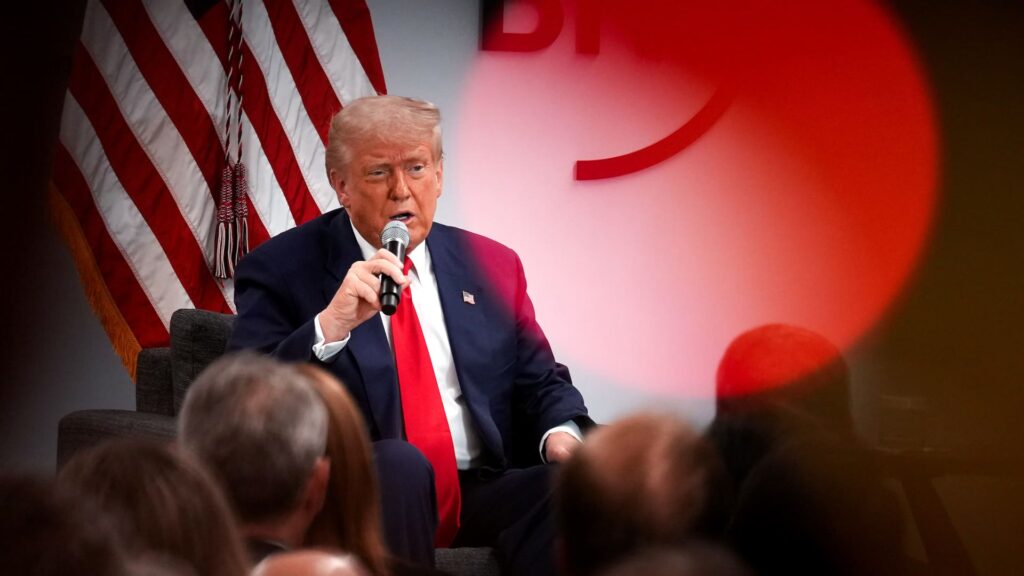
Trump inauguration donors include Meta, Amazon, Target, Delta, Ford
Trump Inauguration Donors: Major Corporations Face Tariff Challenges After Record Contributions
U.S. President Donald Trump delivers remarks at the Business Roundtable’s quarterly meeting at the Business Roundtable headquarters on March 11, 2025 in Washington, DC. (Image: Andrew Harnik | Getty Images)
Table of Contents
- Trump Inauguration Donors Set Record-Breaking Contributions
- Tech Giants Among Top Trump Inauguration Donors
- Food and Beverage Industry Contributions to Trump’s Inauguration
- Retail Sector’s Cautious Approach to Trump Inauguration Donations
- Healthcare and Pharmaceutical Companies as Major Trump Inauguration Donors
- Financial Industry’s Increased Support for Trump Inauguration
- Airlines and Aerospace Companies Among Trump Inauguration Donors
- Automotive Industry’s Significant Contributions to Trump’s Inauguration
Trump Inauguration Donors Set Record-Breaking Contributions
America’s wealthiest and most powerful corporations contributed millions to fund President Donald Trump’s inauguration festivities, making them significant Trump inauguration donors. These corporate contributions led to a record-breaking $239 million in funds raised—more than the combined total of the previous three inaugural committees, according to filings released Sunday.
Major Trump inauguration donors included some of the nation’s largest companies such as General Motors, BlackRock, and Meta. However, three months after these contributions, many of these corporations have seen their businesses disrupted by Trump’s economic policies, particularly his tariff strategy and the resulting consumer caution that has dampened the initial optimism felt when he was elected.
Presidential inaugural committees function as charitable organizations, with funds typically used for parades and galas surrounding the formal swearing-in ceremony. Unlike campaign donations, there are no limits on how much corporations or citizens can contribute to inaugural committees. This makes inaugural donations an early opportunity for companies to publicly demonstrate support for the incoming president and secure influence as policy decisions are being made.
While Trump inauguration donors must be disclosed, the committees aren’t required to reveal how they spend the money. After raising hundreds of millions more than needed for inauguration events, the Trump committee is expected to allocate the surplus toward the president’s future presidential library.
Some notable Trump inauguration donors this year, including Target, McDonald’s, and Delta Air Lines, hadn’t contributed to an inaugural committee in over a decade. Others like Pfizer, Walmart, and Visa maintained their tradition of supporting inaugurations by donating the same amounts they had in previous years.
What united nearly all Trump inauguration donors was their timing—they wrote checks when business optimism about the president’s victory was at its peak. Consumer confidence was soaring, tax cuts seemed imminent, and triple-digit tariffs on trading partners weren’t part of the conversation.
In the months since, many of these same corporations have had their operations upended by Trump’s economic policies centered on tariffs that economists across the political spectrum warn could raise consumer costs and potentially trigger a recession.
Tech Giants Among Top Trump Inauguration Donors
The technology industry’s biggest companies—and many of their CEOs—emerged as significant Trump inauguration donors, contributing to his inaugural fund as part of a strategic effort to establish a more amicable relationship with the White House after a turbulent period during Trump’s first term.
Meta CEO Mark Zuckerberg was particularly eager to get into the president’s good graces after his platform removed Trump following the January 6 Capitol riots. Similarly, Amazon founder Jeff Bezos, who was frequently targeted by Trump largely due to his ownership of The Washington Post, has also sought to improve relations.
Meta and Amazon each donated $1 million to the inaugural fund, as did Google, Apple CEO Tim Cook, Microsoft, and Adobe. AI infrastructure companies Nvidia and Broadcom contributed identical amounts, as did Uber. These substantial contributions from tech industry Trump inauguration donors reflected the sector’s hope that a second Trump administration would reduce regulatory burdens following what they perceived as an onerous period under Biden.
However, the tech industry is now facing pressure from Wall Street amid concerns that a combination of higher import costs and reduced business spending will significantly reduce profit margins. For Meta and Google, the primary issue is the potential decline in advertising budgets, though various challenges affect the entire industry.
Despite being major Trump inauguration donors, tech giants are still contending with regulatory challenges. Google and Meta remain involved in antitrust cases, and Trump’s Federal Trade Commission recently filed suit against Uber over allegedly deceptive billing practices related to its subscription service.
Food and Beverage Industry Contributions to Trump’s Inauguration
In the food and beverage sector, poultry giant Pilgrim’s Pride emerged as the top Trump inauguration donor with a $5 million contribution. Brazilian meat conglomerate JBS, Pilgrim’s largest stakeholder, is currently awaiting approval for a dual U.S.-Brazil public listing while facing opposition from environmental groups, American beef producers, and bipartisan lawmakers.
McDonald’s made its first donation to a presidential inauguration in over a decade, contributing $1 million. Despite being one of Trump’s preferred caterers, the fast-food chain could face scrutiny from Health and Human Services Secretary Robert F. Kennedy Jr., who has pledged to “Make America Healthy Again” and has already targeted artificial food dyes.
The uncertainty created by tariffs and growing recession fears could further impact McDonald’s sales if consumers reduce spending on dining out. The company has already experienced struggling U.S. sales over the past year as customers cut back on restaurant visits.
Fat Brands, owner of Fatburger, Johnny Rockets, and numerous other restaurant chains, donated $100,000 to the inaugural fund despite recent legal troubles. Last year, the company and its chair, Andy Wiederhorn, were indicted over an alleged fraudulent loan scheme worth $47 million—charges they deny.
Among beverage Trump inauguration donors, spirits giant Diageo provided $125,000 in in-kind beverage donations. While facing higher tariffs for some products, its Mexican tequila and Canadian whisky brands are protected by the U.S.-Mexico-Canada trade agreement.
Coca-Cola and PepsiCo, consistent contributors to presidential inauguration funds, also made donations this year. Both companies now face challenges from Kennedy’s health agenda, which is encouraging states to prohibit the use of federal food assistance programs for purchasing sodas and processed foods.
Retail Sector’s Cautious Approach to Trump Inauguration Donations
The retail industry was among the few sectors with a pessimistic outlook after Trump’s election, recognizing the severe impact tariffs could have on their supply chains and consumer spending habits. This concern likely influenced the National Retail Federation (NRF), the industry’s lobbying organization, and retail giant Target to become Trump inauguration donors for the first time in at least a decade.
The NRF contributed $250,000, while Target wrote a check for $1 million. Since Trump’s election, the NRF has consistently warned about how tariffs will affect consumers and retailers, describing them as a tax on American families.
Target faces greater tariff exposure than its main competitor, Walmart, because a larger portion of its sales comes from discretionary items like clothing and home goods that are predominantly manufactured overseas. The retailer’s annual sales have remained stagnant for four consecutive years, and in March, Target projected only 1% growth for the current fiscal year.
In addition to tariff concerns, Target has experienced pressure from conservative groups and customers supporting the administration’s policies. Earlier this year, Target scaled back its diversity, equity, and inclusion initiatives shortly after Trump pledged to dismantle all DEI programs across the federal government.
Despite being Trump inauguration donors, the retail industry’s efforts to persuade the Trump administration to adopt a reasonable approach to tariffs have yielded limited results. The sector has emphasized the difficulty, if not impossibility, of relocating certain manufacturing operations back to the U.S. The industry’s most significant achievement to date was a White House meeting between Trump and the CEOs of Walmart, Target, and Home Depot.
Walmart contributed $150,000 to Trump’s inaugural committee, consistent with its donations to the past three inaugurations, including Biden’s in 2021 and Trump’s first in 2017.
Healthcare and Pharmaceutical Companies as Major Trump Inauguration Donors
The pharmaceutical industry and various healthcare companies became substantial Trump inauguration donors this time around. While Trump has maintained his focus on reducing healthcare costs, the pharmaceutical sector was banking on a more lenient approach toward drugmakers, or at least greater receptiveness to their concerns about Biden-era policies that sought to lower prescription drug prices and increase industry competition.
Now, pharmaceutical Trump inauguration donors are preparing for Trump’s proposed pharmaceutical tariffs while navigating uncertainty around the comprehensive reorganization of federal health agencies under Kennedy, a well-known vaccine skeptic. Trump did provide some relief to the industry last week by signing an executive order targeting a law that permits Medicare to negotiate drug prices—a change long sought by pharmaceutical companies.
PhRMA, the industry’s influential trade association, and leading drugmakers including Pfizer, Merck, Johnson & Johnson, Gilead, and Bayer each donated $1 million, while Eli Lilly contributed $500,000. All were first-time Trump inauguration donors except Pfizer, which had previously contributed $1 million to both Biden’s 2021 and Trump’s 2017 inaugurations.
Vaxcyte, a small clinical-stage vaccine developer, also donated $1 million for the first time—potentially reflecting growing concern among vaccine manufacturers about Kennedy’s leadership, which appears to be already influencing U.S. vaccine policy.
Amgen has shown a pattern of bipartisan support, contributing $500,000 to this year’s inauguration as well as the previous two. Medical device manufacturer Abbott Laboratories also gave $500,000 this year, a significant increase from its contributions in 2021 and 2017.
Outside the pharmaceutical industry, telehealth provider Hims & Hers Health contributed $1 million as it seeks support for its compounded medications, which have encountered opposition from weight loss drug manufacturers like Eli Lilly.
Financial Industry’s Increased Support for Trump Inauguration
The leading players in American finance became more generous Trump inauguration donors this year compared to previous inaugurations, while simultaneously lobbying aggressively for comprehensive deregulation across traditional and cryptocurrency markets.
JPMorgan Chase and Goldman Sachs, the largest U.S. retail bank and one of the most influential Wall Street firms, respectively, each contributed $1 million to Trump’s inauguration, in contrast to making no donations for Biden’s in 2021.
Capital One, which hadn’t donated in the two previous election cycles, gave Trump’s inaugural committee $1 million. At the time, the bank was seeking approval for its $35 billion acquisition of Discover Financial, which was finally approved last week.
BlackRock and Blackstone, the twin giants of the asset management world, each donated $1 million to the inauguration fund after not contributing in the two previous election cycles, positioning themselves as significant Trump inauguration donors.
The stakes for banks were substantial. JPMorgan CEO Jamie Dimon has frequently criticized the “regulatory assault” from Biden-era banking regulators that would reduce revenue by tens of billions of dollars and increase capital requirements for major U.S. banks.
Dimon and other financial Trump inauguration donors, including bank trade associations, opposed efforts to increase the industry’s capital requirements (known as the Basel III Endgame) and fought against Consumer Financial Protection Bureau rules designed to restrict overdraft and credit card late fees.
With Trump’s appointment of Russell Vought to lead the CFPB and the nomination of Michelle Bowman as Federal Reserve vice chair for supervision, banks appear likely to achieve many of their objectives. Vought has dismissed numerous high-profile legal cases against banks and other financial institutions while attempting to shut down the agency, and Bowman is regarded as industry-friendly.
Cryptocurrency players were also generous Trump inauguration donors. Robinhood contributed $2 million to the inaugural committee after not donating in the previous two elections, while Coinbase’s founder and the company together gave a combined $2 million.
Airlines and Aerospace Companies Among Trump Inauguration Donors
Delta and United, both significant Trump inauguration donors with $1 million contributions each to Trump’s inauguration, are reducing their domestic capacity plans this year due to weakening demand, particularly in economy class. (About $250,000 of United’s contribution was an in-kind donation of flights.)
In November, Delta CEO Ed Bastian had expressed optimism that the incoming Trump administration would be a “breath of fresh air” regarding regulation following Biden’s Transportation Department. Under Biden, the DOT had implemented numerous new rules to protect consumers from airline fees and ensure refunds for delayed or canceled flights.
Earlier this month, however, Bastian adopted a different stance on the administration when reporting quarterly earnings. In an interview, he described Trump’s tariff policy as “the wrong approach” and stated that it had negatively affected bookings, forcing Delta to withdraw its earnings forecast for 2025.
Boeing, another major Trump inauguration donor with a $1 million contribution, is the nation’s leading exporter and is again entangled in trade disputes, most notably the escalating tariff conflict with China.
Boeing’s CEO Kelly Ortberg revealed on Wednesday that China has suspended deliveries of its aircraft amid the trade war. He indicated that the company might redirect some airplanes initially destined for Chinese airlines to other customers this year.
While Boeing manufactures its aircraft in the United States, both the company and the producers of major aircraft components like engines and wings depend on a global supply chain that could be affected by the broad 10% tariffs on imports from much of the world that Trump imposed earlier this month, as well as duties on imported aluminum and steel.
Automotive Industry’s Significant Contributions to Trump’s Inauguration
American-based automakers like Ford Motor and General Motors have historically been Trump inauguration donors, but they increased their contributions from hundreds of thousands of dollars to $1 million or more, including vehicles, for Trump’s inauguration this year.
GM, Ford, and the North American operations for Chrysler parent Stellantis each donated at least $1 million to this year’s inauguration. Ford also provided approximately $200,000 in vehicle services as in-kind donations, as disclosed in Sunday’s filing. GM similarly provided vehicles, though the monetary value wasn’t immediately specified.
Beyond the traditional “Detroit automakers,” foreign-based companies Hyundai Motor and Toyota Motor also became Trump inauguration donors, contributing $1 million each to the fund through their American operations, after not participating in the past two inaugurations.
In total, the automotive sector donated approximately $5.3 million to Trump’s inauguration, including $100,000 from Schumacher Automotive, a dealer group based near Mar-a-Lago in West Palm Beach, Florida.
Since the inauguration, Trump has created what some, including Ford CEO Jim Farley, have described as “chaos” regarding automotive tariffs and inconsistent messaging about the levies. The industry is currently facing 25% tariffs on materials like steel and aluminum, as well as 25% tariffs on vehicles imported from outside the U.S. Additional tariffs on automotive parts imported into the U.S. are scheduled to take effect by May 3.
The swift introduction and implementation of these new tariffs has complicated planning for the automotive industry, particularly regarding anticipated increases in auto parts costs. Many smaller suppliers lack the capability to quickly modify or relocate manufacturing operations and may not have sufficient capital to cover tariff expenses, potentially leading to production disruptions.
Following Trump’s indication that he might “help” certain auto companies needing additional time to relocate production or identify new suppliers, no concrete plans have been announced, leaving Trump inauguration donors from the automotive sector in a state of uncertainty about the future.






